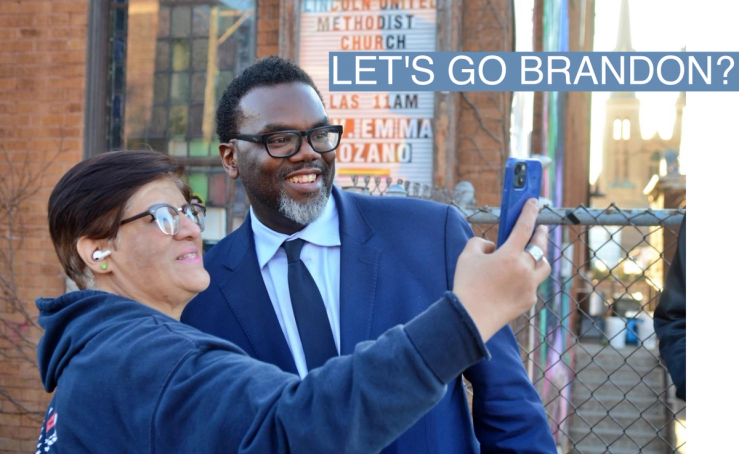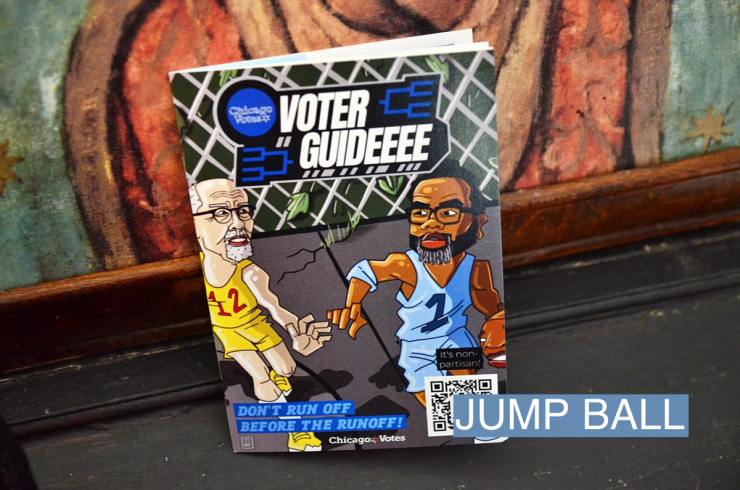The Scene
CHICAGO, Ill. — The race to replace Mayor Lightfoot is tightening. The candidates, both Democrats, could not be further apart.
On Sunday, Cook County Commissioner Brandon Johnson campaigned across heavily Black wards on the city’s South Shore and west side, promising to raise taxes on the “ultra-rich” and pour their money into the community.
“During the Great Depression, they gave white men shovels before there were places to dig. They gave them housing. They gave them free college. No one called it entitlement,” said Johnson. “In the city of Chicago, we have stuff to build and lives to save.”
The next day, ex-Chicago Public Schools CEO Paul Vallas rallied with union leaders who’d already endorsed him, decrying Johnson’s tax plan and worrying about crime. Johnson’s proposed taxes, said Vallas, were “job killers at a time when the city is struggling” that came from a candidate who wanted to “defund the cops.”
In this article:
David’s view
Voter worries about crime have defined Biden-era city elections in major cities, from the victory of New York Mayor Eric Adams in 2021 to last year’s recall of ex-San Francisco District Attorney Chesa Boudin.
Neither city faced as much violent crime per capita as Chicago. Vallas, a non-factor when he ran for mayor four years ago, rode the issue to a fundraising lead and first-place primary showing.
“I feel like I need to have a gun in my house,” said Jim Sweeney, the president of IUOE Local 150, as he stood beside Vallas. “This is not the Chicago I grew up in.”
But Chicago’s election isn’t another black-and-white story about liberal cities rebelling against crime. One week out from the April 4 runoff, the 69-year old Vallas and 47-year old Johnson are in a dead heat, separated by single digits in polls, in a city that’s gotten used to landslides.
Johnson, a teacher and union activist who helped organize the city’s resurgent left, has portrayed Vallas as an incompetent executive who’d rather talk about crime than his record — and a crypto-Republican in a community that gave Donald Trump just 16% of the vote.
Vallas, campaigning with fellow “lifelong Democrats” to help blunt those attacks, calls Johnson “bought and paid for by the Chicago Teachers Union,” and warns that the city might not recover from a left-wing mayor.
Vallas grabbed 33% of the vote to 22% for Johnson. Both candidates got the opponent they wanted to maximize their contrasts: For Johnson, a white moderate who’d made enemies in the other cities that hired him. For Vallas, a Black progressive who’d mused about “redirecting money away from policing,” an electoral anchor for other Democrats.
“Brandon Johnson isn’t going to be the mayor of this city,” Lightfoot scoffed at one pre-primary campaign stop, at a moment when Rep. Jesus “Chuy” Garcia looked like a more credible progressive candidate.

But most Chicagoans who didn’t vote for Vallas last month went for someone running to his left, including Lightfoot, who started the attacks on his donations from Republicans. Her ads featured a 2009 interview clip where Vallas called himself “more of a Republican than a Democrat” and said that he was personally “pro-life.”
Johnson’s campaign, which includes strategists who worked on Vermont Sen. Bernie Sanders’ 2020 presidential bid, went after Vallas relentlessly for his criticism of some Democrats and progressive ideas. This week, lawn signs with no listed sponsor began appearing in Black precincts on the city’s south side – Vallas’ name next to a Trump-style “MAGA 2024” logo. Vallas blamed Johnson for the signs, which Johnson flatly denied.
“It’s embarrassing, it’s humiliating. It’s really insulting when you really think about it,” Vallas said on Monday. “You have a whole conversation about how you’ve been an undying supporter of Roe vs. Wade and women’s reproductive rights. And then when somebody asks you about your personal religious convictions, you make a comment, and that’s the comment that shows up in commercials.”
But the message had made inroads with the city’s heavily Democratic electorate. “More than anything, it’s the problem with Vallas,” said Josef Michael Carr, an organizer of Johnson’s Sunday stop at a South Shore school gym. “Brandon is a great candidate. But you see on the news that Vallas, he’s associated with many people that supported former President Trump. And that just doesn’t sit well with most Chicagoans.”
Know More
Johnson, who’ll campaign with Sanders on Thursday, has also connected his party loyalty to his progressive tax and schools agenda — one that has been stymied by generations of mayors since the death of Mayor Harold Washington in 1987.
“Vallas needs the middle class and working class people to pay so that his donors can make good on their investment in his campaign,” Johnson said in a Monday speech to the City Club of Chicago. “I believe that the wealthy should pay their fair share, just like all Democrats.”
But there are many kinds of Democrats in Chicago, and Johnson is building on left-wing organizing that started as a response to two-term Mayor Rahm Emanuel. The CTU and its national affiliates have put more than $2 million combined into a campaign to defeat Vallas; the United Working Families labor coalition, founded in 2014, is canvassing for votes. It endorsed Johnson last September, when he was polling in the low single digits.
“The terrain of the 2023 municipal elections — including a weak mayor and an unprecedented wave of aldermanic retirements — provides us with a generational opportunity to continue organizing for radical alternatives and mass-based political power,” UWF wrote in its endorsement resolution.
In Vallas, the union sees a long-time enemy whose real education plan can be seen in his charter school advocacy in other cities. In Johnson, the union has a candidate who favors strong “neighborhood schools” over a system of school choice and selective enrollment.
“We cannot afford to have a stratified school district where you have to apply in order to have access to a quality school,” Johnson said on Monday. “We’re talking about the desires of families and parents like mine, who do not want to receive letters deeming their children ineligible. That’s an inequitable structure.”
Some “radical” ideas have not made it. In debates, Johnson has repeatedly rejected the “defund” approach to policing, emphasizing the part of it that got lost in the protests of 2020 — that more jobs and resources in deprived neighborhoods would prevent crime. He portrays Vallas’ promise to fill the more than 1000 vacancies in the police force as an unrealistic quick fix that’s less effective than his own plan to hire more detectives.
“I’m not going to defund the police,” Johnson said at the City Club event. “Wouldn’t it just be easier to believe a Black man when he’s telling you the truth?”
Notable
- In the New York Times, Jonathan Weisman frames the race as a clash between the CTU and the FOP, with police union president John Catanzara acting as a drag on Vallas. Catanzara predicted “blood in the streets” and a mass exodus of cops if Johnson prevailed; one day later, Vallas called those comments “absolutely irresponsible.” Previously, in an interview with Semafor, Vallas emphasized that he’d been endorsed by the FOP’s “rank and file,” not its president, who’s not an electoral asset in a Democratic city.


